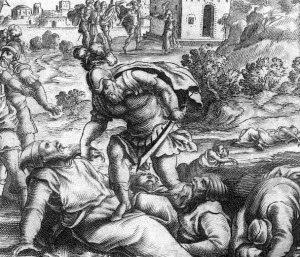From the First Book of Samuel:
Now a certain man of the servants of Saul was there that day, detained before the Lord; his name was Doeg the Edomite, the chief of Saul’s shepherds.
(From the Daily Office Lectionary – 1 Samuel 21:7 (NRSV) – July 19, 2013.)
 I often find myself intrigued by the lesser characters we find in the Bible. At one time I started a project of writing short stories, sort of fictional midrash about some of them, but that project never went very far. Still, when a reading includes mention of someone I’ve not noticed before, it stirs my curiosity and my imagination.
I often find myself intrigued by the lesser characters we find in the Bible. At one time I started a project of writing short stories, sort of fictional midrash about some of them, but that project never went very far. Still, when a reading includes mention of someone I’ve not noticed before, it stirs my curiosity and my imagination.
Doeg the Edomite is mentioned in only four verses in two chapters of the First Book of Samuel; here and then in three verses of the next chapter. Those verses tell us that Doeg witnessed Ahimelech and the other priests give aid to David at Nob, told Saul what he had seen, was commissioned by Saul to punish the priests, and killed 85 of the clergy. The last mention of him is when David apologizes to Ahimelech’s son Abiathar for being the cause of his father’s death and offers Abiathar his protection:
David said to Abiathar, “I knew on that day, when Doeg the Edomite was there, that he would surely tell Saul. I am responsible for the lives of all your father’s house. Stay with me, and do not be afraid; for the one who seeks my life seeks your life; you will be safe with me.” (1 Sam. 22:22-23)
Doeg is identified as an Edomite but paradoxically as a chief shepherd in Israel, the latter term suggesting that he was not a tender of sheep, but rather a member of the Sanhedrin (a sort of parliament) or the Beth Din (a sort of supreme court). Therefore, rabbinic literature suggests that his identification as an “Edomite” merely refers to the land of his birth; it does not mean that he was a non-Jew.
According to midrashic tradition, Doeg was punished by three angels for his betrayal of David and his killing of the priests; one made him forget his learning, one incinerated his soul, and one scattered the ashes in the synagogues and study halls.
One of the minor tractates of the Babylonian Talmud, the Avot de-Rabbi Nathan, makes note of the fact that Doeg was one of three people who spoke the truth and died for it; what he reported about the priests at Nob was true, but it need not have been reported and the report led to needless death. (I don’t know, by the way, who the other two people who died for speaking truth would have been, although I have tried to find out.) Doeg is also listed in the midrashic literature as one of seven people (three kings and four commoners) who are said to have no share in the next world. I’m not sure what that means, whether the implication is that their souls wander aimlessly through nothingness or if they simply cease to exist, but the statement is there for whatever it is worth.
That is what I find most interesting about this minor character, that he has inspired such interest among the rabbis who wrote and compiled the various forms and collections of extra-biblical literature. What this suggests is that, in truth, there are no minor characters . . . in the Bible or in life.
No one is insignificant! One may not get top billing. One may only have a walk-on part, as it were. One may only be mentioned in a few verses of the book of life, perhaps only in one. But no one is insignificant. Not even Doeg the Edomite.
====================
A request to my readers: I’m trying to build the readership of this blog and I’d very much appreciate your help in doing so. If you find something here that is of value, please share it with others. If you are on Facebook, “like” the posts on your page so others can see them. If you are following me on Twitter, please “retweet” the notices of these meditations. If you have a blog of your own, please include mine in your links (a favor I will gladly reciprocate). Many thanks!
====================
Father Funston is the rector of St. Paul’s Episcopal Church, Medina, Ohio.



Leave a Reply